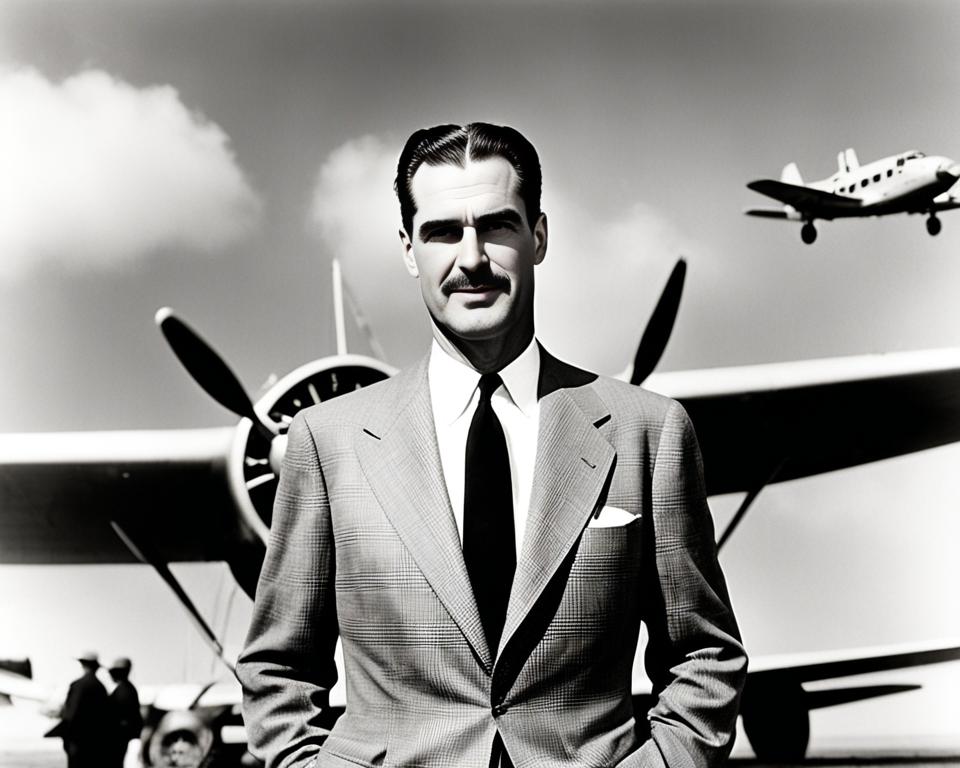Howard Hughes, a prominent figure in American history, amassed immense wealth through his diverse range of business ventures and entrepreneurial success. Born on December 24, 1905, in Houston, Texas, Hughes was a multi-talented individual who excelled in various fields, leaving an indelible mark on industries such as film, aviation, and real estate.
Initially gaining fame in Hollywood as a film producer, Hughes produced notable films such as “The Racket” (1928), “Hell’s Angels” (1930), and “Scarface” (1932). His involvement in the film industry led to the acquisition of RKO Pictures, propelling him to become one of the wealthiest and most influential people in the world.
However, Hughes’ financial empire extended far beyond Hollywood. In the aviation industry, he founded the Hughes Aircraft Company in 1932 and set numerous world air speed records, solidifying his prominence in the field. He also acquired and expanded Trans World Airlines (TWA) and owned Hughes Airwest Airlines.
As his success continued to grow, Hughes delved into the Las Vegas business scene, acquiring major real estate properties, hotels, casinos, and media outlets. His investments in this thriving city further added to his already vast wealth.
Howard Hughes’ ability to excel in multiple industries and his astute business acumen contributed significantly to his financial success. Today, his legacy lives on through the Howard Hughes Medical Institute and the Howard Hughes Corporation, which continue to make a positive impact in various fields.
Key Takeaways:
- Howard Hughes made his money through a combination of his success in Hollywood as a film producer.
- His involvement in the aviation industry, including the establishment of the Hughes Aircraft Company and his ownership of Trans World Airlines, played a significant role in his wealth accumulation.
- Hughes expanded his financial empire by investing in Las Vegas, acquiring major properties, hotels, casinos, and media outlets.
- His entrepreneurial success and astute business acumen allowed him to build a lasting legacy in various industries.
- Howard Hughes’ wealth continues to impact fields such as medicine and real estate through the Howard Hughes Medical Institute and the Howard Hughes Corporation, respectively.
Table of Contents
Hughes’ Early Life and Inheritance
Howard Hughes, born on December 24, 1905, in Houston, Texas, was the only child of Allene Stone Gano and Howard R. Hughes Sr. His father was a successful inventor and businessman who founded the Hughes Tool Company. This company was renowned for inventing a superior two-cone bit for drilling oil wells, revolutionizing the industry.
At the age of 19, Hughes inherited his father’s company, becoming a millionaire overnight. This inheritance provided him with the financial resources to pursue his passions and ambitions.
Throughout his early life, Hughes showed a keen interest in science and technology, with a particular fascination for engineering. He attended the prestigious California Institute of Technology (Caltech) before transferring to Rice University. However, tragedy struck with the untimely deaths of both his parents, causing Hughes to drop out of Rice University to manage his father’s company and focus on his growing career.
Despite leaving formal education, Hughes’ passion for knowledge and innovation continued to drive him forward. His upbringing and early exposure to his father’s business undoubtedly shaped his entrepreneurial spirit and laid the foundation for his future success in both Hollywood and the aviation industry.
Image:
Key Points:
- Howard Hughes was the son of Allene Stone Gano and Howard R. Hughes Sr.
- His father founded the Hughes Tool Company, known for inventing a groundbreaking drilling tool.
- At the age of 19, Hughes inherited his father’s company, securing his financial future.
- Hughes demonstrated a strong interest in science and technology from an early age.
- He attended Caltech and dropped out of Rice University after his parents’ deaths.
Hughes’ Hollywood Career
Howard Hughes found great success in Hollywood as a film producer, making his mark with notable films such as “The Racket” (1928), “Hell’s Angels” (1930), and “Scarface” (1932). His involvement in the industry expanded when he acquired RKO Pictures, a major film studio during Hollywood’s Golden Age, in 1948. However, his control over the production company faced challenges, and ultimately, RKO Pictures ceased operations in 1957.
Hughes’ passion for aviation and aerospace also played a significant role in his Hollywood career. In 1932, he formed the Hughes Aircraft Company, assembling a team of talented engineers and designers to work on innovative projects. His deep-rooted interest in aviation even led him to produce and direct the film “Hell’s Angels,” where he famously amassed a fleet of vintage planes to create realistic aerial scenes.
Despite the challenges faced in the film industry, Hughes’ Hollywood career remains a testament to his passion for both film production and aviation.
Hughes’ Achievements in Aviation
Howard Hughes made significant contributions to the field of aviation, setting multiple world records and building remarkable aircraft. His passion for aviation propelled him to new heights, earning him prestigious accolades and leaving a lasting impact on the industry.
World Air Speed Records
- In 1937, Hughes set the Transcontinental airspeed record by flying from Los Angeles to Newark, NJ, at an average speed of over 352 miles per hour.
- In 1938, he shattered the round-the-world airspeed record, completing the journey in just 91 hours and 14 minutes.
These record-breaking achievements solidified Hughes’ reputation as a pioneering aviator and showcased his unwavering determination and technological innovation.
Remarkable Aircraft
Hughes’ passion for building cutting-edge aircraft led to the creation of iconic planes in aviation history:
| Aircraft | Description |
|---|---|
| Hughes H-1 Racer | An innovative racing aircraft designed for speed, the H-1 Racer set a new landplane speed record in 1935, reaching a top speed of 352 miles per hour. |
| Hughes H-4 Hercules (Spruce Goose) | An enormous flying boat with a wingspan of 320 feet, the H-4 Hercules captivated the world. While only flown once, it remains an iconic symbol of Hughes’ engineering prowess. |
Expansion in the Aviation Industry
Not only did Hughes achieve remarkable feats in aircraft design, but he also had a significant presence in the airline industry:
- Hughes acquired Trans World Airlines (TWA) in 1939, expanding its operations and solidifying it as a major player in the aviation world.
- He later acquired Air West and renamed it Hughes Airwest, expanding his influence in the regional airline market.
Prestigious Recognition
Howard Hughes received a multitude of prestigious awards and honors for his contributions to aviation, including:
- The Harmon Trophy, recognizing his outstanding achievements in aviation.
- The Collier Trophy, awarded for his significant contributions to aerospace innovation.
- Induction into the National Aviation Hall of Fame, honoring his lasting impact on the aviation industry.
Howard Hughes’ achievements in aviation revolutionized the industry and continue to inspire future generations. His world records, groundbreaking aircraft designs, influence in the airline industry, and prestigious recognition solidify his place as an aviation legend.
Hughes’ Business Ventures and Las Vegas Empire
Beyond his success in Hollywood and aviation, Howard Hughes ventured into various business endeavors. He expanded his father’s Hughes Tool Company, which was known for inventing a superior two-cone bit for drilling oil wells. Hughes used the profits from the company to fuel his other business ventures.
One of Hughes’ notable business expansions took place in Las Vegas, where he made significant investments in real estate, hotels, casinos, and media outlets. In 1966, facing a large tax bill in California, Hughes moved to Las Vegas and purchased the Desert Inn hotel for $13 million.
This acquisition marked the beginning of Hughes’ buying spree in Las Vegas. He went on to acquire other iconic hotel casinos, including the Sands, Castaways, and Frontier hotels. Additionally, Hughes purchased the Landmark Hotel and Casino, the Silver Slipper Casino, and the Sahara Hotel and Casino.
Howard Hughes’ Las Vegas Purchases
| Hotel/Casino | Date of Acquisition |
|---|---|
| Desert Inn | 1966 |
| Sands | 1967 |
| Castaways | 1967 |
| Frontier | 1967 |
| Landmark | 1969 |
| Silver Slipper | 1969 |
| Sahara | 1970 |
In addition to his hotel and casino ventures, Hughes acquired the Las Vegas Industrial Park and McCarran International Airport. He also purchased KLAS-TV, a television station in Las Vegas, further expanding his media interests.
Aside from his Las Vegas investments, Howard Hughes was also connected to the CIA’s Project Azorian. In the 1970s, he commissioned the construction of a ship called the Hughes Glomar Explorer. The purpose of this project was to recover a sunken Soviet submarine, demonstrating Hughes’ involvement in top-secret government operations.
Howard Hughes’ ventures in Las Vegas and other industries further solidified his status as a business magnate and diversified his financial empire.
Conclusion
Howard Hughes, a remarkable figure in history, left behind an enduring legacy through his remarkable achievements and successful business ventures. With his immense wealth, Hughes made his mark in Hollywood, aviation, and Las Vegas, solidifying his prominent position in each industry.
Following his passing in 1976, Hughes’ impact continued through the establishment of the Howard Hughes Medical Institute and the Howard Hughes Corporation. These institutions served as testaments to his dedication to advancing medical research and his entrepreneurial spirit, respectively.
Today, Hughes’ story serves as an inspiration for aspiring entrepreneurs and innovators, showcasing the rewards of determination, vision, and perseverance. His financial empire, coupled with his contributions to various fields, including film, aviation, and medical research, cemented his place in history as one of the most influential figures of the 20th century.


